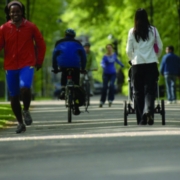Run the park, but keep the Parkrun: The Parkrun controversy
Parks are considered by many to be public assets. When they are well-kept and accessible to all, they are the hub of any community. Unfortunately, their upkeep is a non-statutory service, which means that the Government does not offer specific funding for them. As such, local authorities across the UK are struggling to maintain their upkeep and our parks and green spaces are very much falling victim to the austerity cuts made to local authorities’ budgets.
With this lack of funding, it probably shouldn’t come as much of a surprise to hear that a parish council near Bristol is struggling to pay for the upkeep of its park’s paths. To compensate, this parish council has decided to charge a fee to those involved in the local Parkrun group, who hold an inclusive running event at Little Stoke Park each week.
This decision has been widely criticised and condemned; Parkrun is advertised as a free weekly event that attempts to remove potential barriers, including cost, from exercise to get people fit. Parkrun has groups all over the world, and has been praised by Government, who described it as “a new model for community sport volunteering” in the recent Sporting Future paper from the Department of Culture, Media and Sport.
Despite the event’s free status, Stoke Gifford Parish Council has claimed that Parkrun places a significant strain on the park paths, and that the runners should therefore contribute to its upkeep. It has recently voted through a proposal to charge adult Parkrun participants £1 every week they attend. Understandably, this has angered many people who believe that the parish council is undermining the ethos of Parkrun.
In response to the outcry, Stoke Gifford Parish Council has argued that many of the runners come from outside of their boundaries, and so do not pay taxes towards its upkeep. This is a problematic statement to make as, regardless of where they pay it, these people will pay taxes, some of which will fund their local parks. Even if the parks they attend are outside of their area, arguably public parks should be free for all – not just to those who pay for their upkeep. It also raises the question of how the council expect to tackle this issue fairly. Currently, by charging everybody involved in Parkrun, they are charging residents who do pay taxes in the parish twice. Yet if they were to only charge those coming from outside of the parish boundaries, they would require a system that checks the attendee’s address against their boundaries. The problem is, a system like this could prove costlier than the money earned, making it redundant.
So, if we rule out charging runners, what else could the parish council do to raise the necessary funds? The park is leased by the parish council from their local authority. They don’t have permission to charge people to use the carpark, yet there are other innovative ways of making money from green spaces. APSE Principal Advisor Wayne Priestley has been following the situation at Little Stoke Park. He suggests there are a number of ways that the council can make money for the upkeep of the paths. One of the simpler ideas is to have a donation box. Placing this near the start/finish line with a friendly poster asking for donations will mean that those who can pay are likely to contribute. This method doesn’t leave anybody at a disadvantage, yet still raises funds.
Another potential way of raising these funds is by opening a coffee shop. Parkrun typically organises an informal post-run coffee for its attendees, which the council could provide, either as a permanent fixture or as a ‘pop-up’ at specific events like these. If not a coffee shop, some parks organise franchised or in-house workout classes to take place in their parks. These are paid for by attendees, to the advantage of the park. These classes could even be advertised to the Parkrun group as an extra for those willing to pay for further fitness experiences beyond Parkrun.
There is also the potential idea of getting either the Parkrun or the actual park sponsored by a company or organisation that would be willing to pay for the upkeep of the park. In fact, there is also a case for going to the Health and Wellbeing Board and pitching the Parkrun as a preventative measure which needs to be maintained for the community. With many options available, charging people to participate in a Parkrun event should be at the bottom of the list.
All of this is moot, however, if you believe that the Government should make parks a statutory service. Parks require stable funding to continue to be the inviting, inspiring places they are, yet this should not be at the expense of those who are trying to help themselves get fit. At APSE, we believe that parks should receive statutory funding from the Government, in the belief that the public benefits they bring should be publicly funded through taxes raised, without the need for further charges.
Ultimately, you could charge everybody to use a park, and justify it. However, under the government’s ‘Rethinking Parks’ initiative, parks are supposed to entice people outside. They are expected to be used to boost mental and physical health, get people exercising and create community cohesion. As such, parks are highly beneficial for people of all walks of life and it is time we ensured that they will be preserved for the benefit of future generations. That can only come through a stable source of income, which only statutory funding can guarantee.


.png)



.png)